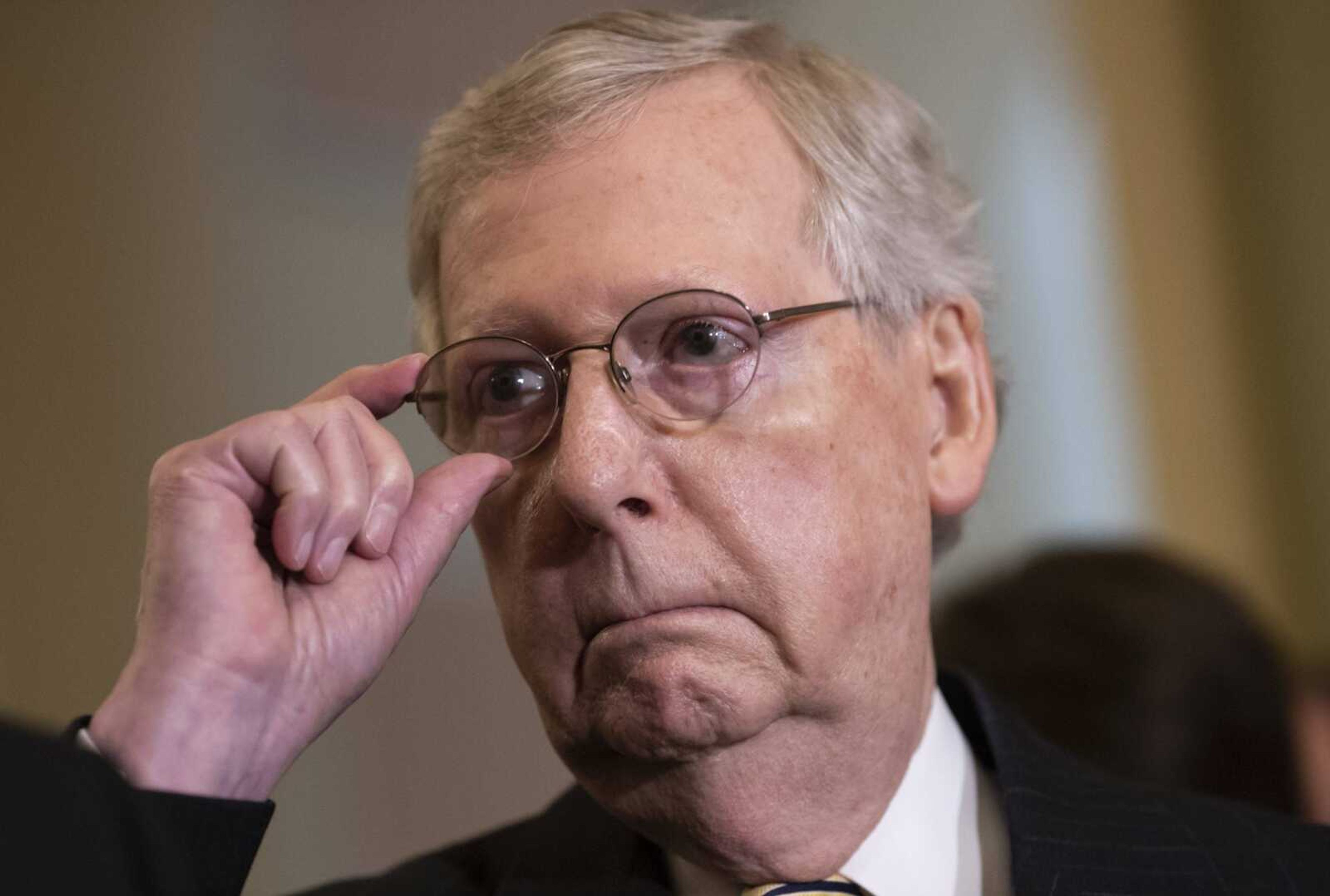GOP senators push for bill to rein in Trump on tariffs
WASHINGTON -- Key Senate Republicans are pushing longshot legislation to require Congress to sign off on President Donald Trump's import tariffs, a rare attempt to stand up to the administration on a bedrock issue that once defined the GOP. Congressional Republicans are mostly at odds with what they view as Trump's protectionist instincts on trade. ...
WASHINGTON -- Key Senate Republicans are pushing longshot legislation to require Congress to sign off on President Donald Trump's import tariffs, a rare attempt to stand up to the administration on a bedrock issue that once defined the GOP.
Congressional Republicans are mostly at odds with what they view as Trump's protectionist instincts on trade. Despite much hand-wringing, prospects for any bill to challenge him remain uncertain. Many Republicans are hesitant to confront Trump in a legislative showdown potentially ending badly for them. Doing so could court a veto and bruise their standing with Trump voters they need in midterm elections.
Senate Majority Leader Mitch McConnell, R-Ky., indicated he was not interested in spending too much time on the effort presented behind closed doors Tuesday by its chief proponent, Sen. Bob Corker, R-Tenn., saying he preferred to focus on "getting bills passed." And the second-ranking Republican, Sen. John Cornyn of Texas, said he hoped Republicans concerned about the tariffs could prevail on the president to reverse course. He was heading to the White House later Tuesday for talks.
"Not everything we do has to be legislative. Part of this job is persuasion," Cornyn said. He said lawmakers would "continue to make the case" with the president and his staff, which he noted is divided.
Trump took office promising to rip up trade deals and crack down on unfair trading practices. But the campaign slogan is at odds with Republicans' longstanding preference for free markets and open trade. The standoff is raising an uncomfortable question: If Republicans can't confront Trump on trade, can they challenge him on anything?
"For Republicans, this is who we are," said Sen. Jeff Flake, R-Ariz. "If we believe our own rhetoric -- on trade, tariffs and congressional prerogative -- I hope it does come to a vote."
The idea being pursued by Corker, Sen. Pat Toomey, R-Pa., and others who have been meeting privately and with Democrats would be narrowly crafted legislation requiring congressional approval of the tariffs Trump has imposed in the name of national security.
They're targeting Trump's reliance on the so-called 232 authority, named from Section 232 of the Trade Expansion Act of 1962, which allowed the administration to impose tariffs of 25 percent on imported steel and 10 percent on imported aluminum from Mexico, Canada and the European Union, some of the U.S.'s top allies.
The senators are also hoping to halt Trump's threat to slap tariffs on auto imports, including those from Japan.
Corker says there's "no way" automobiles and the other imports are a national security threat. It's not just Trump, the senators say, but past administrations have leaned too heavily into the national security provision they now want to subject to congressional oversight.
"When you can just name anything as a national security issue then basically you undermine the whole trade agreement process," Corker said Tuesday.
Corker's trying to hitch the legislation to a big annual defense bill making its way through the Senate including must-pass pay raises for the troops and other provisions.
Senate Republicans have warned administration officials the tariffs could dampen the economic gains from the GOP tax cuts.
Senate Minority Leader Chuck Schumer, D-N.Y., said he spoke to Corker about the legislation Tuesday. "I believe there is some Democratic support for it," Schumer said.
But Corker acknowledged the difficulty in passing legislation despite "tremendous concern" among lawmakers in both parties. "My guess is the administration may have some resistance," he said.
Time and again, Republicans in Congress have been reluctant to put guardrails around Trump as the administration has veered from GOP orthodoxy in policy or as the president interprets the law, as he did earlier this week, to assert the special counsel probe is unconstitutional and he has the power to pardon himself.
Flake is one of the few Republicans who repeatedly take on Trump, and he has separately offered a bill that would reverse the steel and aluminum tariffs, with support from Democratic Sen. Heidi Heitkamp of North Dakota.
Farm-state senators are particularly concerned about retaliatory tariffs that would close off foreign markets to pork and key crops like soybeans and corn. "It isn't as if the dog has not barked," said Sen. Pat Roberts, R-Kan., the chairman of the Senate Agriculture Committee.
But it's unclear what lawmakers are willing to do besides bark. Challenging Trump comes with its own risks, from alienating his supporters to taking voters' attention off a healthy economy before the midterm elections, which will determine control of the House and Senate.
Asked if Congress will act on trade, Sen. Roy Blunt, R-Mo., a member of GOP leadership, answered simply: "No."
Connect with the Southeast Missourian Newsroom:
For corrections to this story or other insights for the editor, click here. To submit a letter to the editor, click here. To learn about the Southeast Missourian’s AI Policy, click here.









